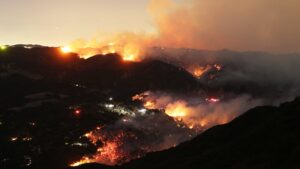How to Navigate the Chaos of Wildfires: Your Essential Recovery Guide
At Extreme Investor Network, we understand that navigating the aftermath of a catastrophic event like wildfires can be overwhelming. With recent fires in Southern California claiming thousands of homes and causing significant damage, it’s imperative to know the steps you can take to manage the chaos and recover effectively. While many resources provide general information, our tailored guide aims to offer unique insights and actionable advice that set you on the path to recovery.
The Urgency of Filing Claims
When disaster strikes, one of the most crucial actions you can take is filing your insurance claim as soon as possible. Karl Susman, an experienced insurance broker from Los Angeles, emphasizes the importance of initiating the claims process even when the situation feels chaotic.
Key Tip: You don’t need to wait for the fire to be fully extinguished or for an assessment of your property damage. The sooner you file your claim, the better positioned you are to navigate the influx of claims that insurers face during widespread disasters.
Step 1: File Your Claim Before You Assess Damage
One of the most common misconceptions is waiting until firefighters have contained the blaze or until you can visibly inspect your property. You can start the claim process based on what you know and any available documentation. It’s vital for both homeowners and renters to realize that they have access to nearly the same resources in this stressful time.
What to Do Next: After ensuring your safety, file your insurance claim immediately. Document your conversations, gather any initial evidence of damage, and start creating a timeline of events.
Step 2: Understand Your ‘Loss of Use’ Coverage
Many policies include a "loss of use" provision, allowing individuals to secure temporary housing if their homes are uninhabitable. Jeremy Porter from First Street Foundation points out that this could be a financial lifeline during recovery.
Action Item: Review your insurance policy carefully. Ask your insurer about this coverage and how you can utilize it effectively while you search for alternative housing.
Step 3: Keep Detailed Records
Documentation is your best friend during the claims process. Whether you are purchasing essentials like clothes or lodging temporarily, every receipt counts. Douglas Heller from the Consumer Federation of America advises maintaining thorough records to help substantiate your claims later.
Pro Tip: Use cloud storage or apps to keep everything organized. Photos, email exchanges, and billing statements should all be easily accessible.
Step 4: Turn Off Utilities
Severe damage may necessitate shutting off your utilities. Susman recommends contacting your electricity, water, and trash collection providers to halt service.
Why It Matters: You may not only safeguard your property but could also avoid unnecessary costs during this challenging period.
Step 5: Review Your Auto Insurance Policies
Your vehicle may have also been affected if left in a wildfire zone. Don’t forget to reach out to your auto insurance provider about potential coverage for fire damage.
Key Insight: Coverage may fall under "comprehensive" rather than home insurance, even if the vehicle was parked at your residence. Review this carefully to ensure you receive proper compensation.
Step 6: Property Taxes Matter
If your home was damaged or destroyed, consider looking into property tax adjustments. If your damages exceed $10,000, you may be eligible for tax relief in your county.
Action Step: Visit your local assessor’s office online and submit an application as soon as possible to reduce financial burdens while you rebuild.
Step 7: Seek Local Aid and Resources
In the wake of the fires, both federal and local resources may offer significant assistance for those impacted. President Biden has announced a one-time payment for wildfire victims, and FEMA’s assistance programs can help cover immediate housing needs.
Important: Register for aid through DisasterAssistance.gov or call FEMA’s hotline at 1-800-621-3362. Stay informed about workshops and support groups as they can provide crucial guidance.
In summary, navigating the aftermath of a wildfire can seem like an insurmountable challenge. By taking organized and deliberate steps, you can reclaim control over your recovery process. At Extreme Investor Network, we’re dedicated to equipping you with the knowledge and resources needed to weather any financial storm. Stay informed, stay prepared, and remember that recovery is a journey—take it one step at a time.

